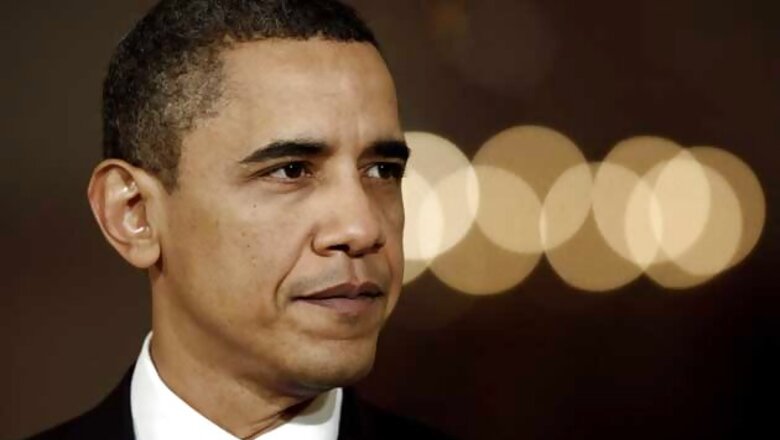
views
Washington/Venice: British energy giant BP Plc agreed on Wednesday to President Barack Obama's demand to place about $ 20 billion in a special fund to pay damage claims from the Gulf of Mexico oil spill.
A source with knowledge of the agreement confirmed to Reuters the preliminary deal, which followed talks between Obama and top BP executives, their first since the start of the 58-day-old crisis.
Obama told Americans in a televised speech on Tuesday he would demand at Wednesday's White House meeting that BP set aside the money in an independently administered fund to pay for the claims, although he did not specify an amount. Lawmakers though had called for $ 20 billion to be set aside. BP shares trading in New York initially rose more than 1 per cent on news of the agreement after falling 5 per cent in morning trade.
However, they dipped again as an administration official said the $ 20 billion would not cap the amount BP is responsible for paying. "It takes a little bit of pressure off BP," Iain Armstrong, an oil analyst at brokerage Brewin Dolphin in London, said of the news of the escrow agreement.
"If it gets Obama off their back, it can't be that bad." What remains unclear is how BP would pay for the fund, also known as an escrow account, and how its quarterly dividend might be affected.
Some US lawmakers have called on the company to suspend payment of the dividend to ensure it has enough money to pay for damages, unnerving investors.
On recent visits to the US Gulf coast, Obama has heard complaints from residents that the claims process is too long and complicated and that BP is paying out too little money.
BP executives, including Chairman Carl-Henric Svanberg, CEO Tony Hayward and BP US boss Lamar McKay, filed into the West Wing of the White House just before 10 a.m. ET (1400 GMT) for talks with Obama, their first since the crisis began.
The talks were due to last for about two hours, a White House official said. Kenneth Feinberg will administer the BP escrow fund, according to the source. Feinberg was the "pay czar", the official who oversaw compensation for executives at companies that received federal bailout funds.
Feinberg also oversaw a compensation fund for victims of the September 11, 2001, attacks on the United States.
The BP executives were accompanied by the company's legal counsel Rupert Bondy and noted Washington lawyer Jamie Gorelick, a former deputy attorney general in the Clinton administration.
The White House team included: White House counsel Bob Bauer; Larry Summers, one of Obama's top economic advisers; Coast Guard Admiral Thad Allen, the administration's point man for the crisis; Attorney General Eric Holder; and a number of other Cabinet members.
'REASONABLE CLAIMS'
Underscoring concerns in Britain that Obama is trying to increase BP's potential liabilities for the spill, British Prime Minister David Cameron said BP was eager to face claims arising from the spill but it should not have to pay any that are too far removed from the disaster.
Cameron is under intense domestic pressure to stand up for BP, which many Britons perceive is being treated too harshly by the US administration to the detriment of British pension funds and other investors with big stakes in BP.
"While it's important that they (BP) pay reasonable claims, and BP accept this themselves, they do need a level of certainty, and this is BP's worry, that there won't be claims entertained that are three or four times removed from the oil spill," Cameron said during a BBC radio phone-in program.
James Guiang, senior portfolio manager at Millennium Global Natural Resources Fund, said BP needed to cut a deal with Obama.
"Whenever you go up against a government, you're not going to win," he said. The cost of insuring BP debt against default rose after rating agency Fitch downgraded BP's rating by six notches on Tuesday.
Dutch bank ING said it expected other agencies to follow suit. Fitch said on Wednesday BP had a large enough war chest to cover the clean-up costs of the spill and defended its downgrade of BP's rating, saying the company faced a number of uncertainties. As BP tries to rebuild its battered image with investors worried about how much the spill is going to end up costing, it continued to wrestle with the oil spill in the Gulf.
It started up a second system to siphon oil from its gushing leak early on Wednesday, a day after a team of US scientists raised their high-end estimate of the amount of crude oil flowing from its well by 50 per cent to between 35,000 and 60,000 barrels per day.
The new containment cap system is intended to increase overall collection capacity to 28,000 barrels a day from around 15,000 a day now.
The company is drilling relief wells that it hopes will definitively halt the spill in August.

















Comments
0 comment